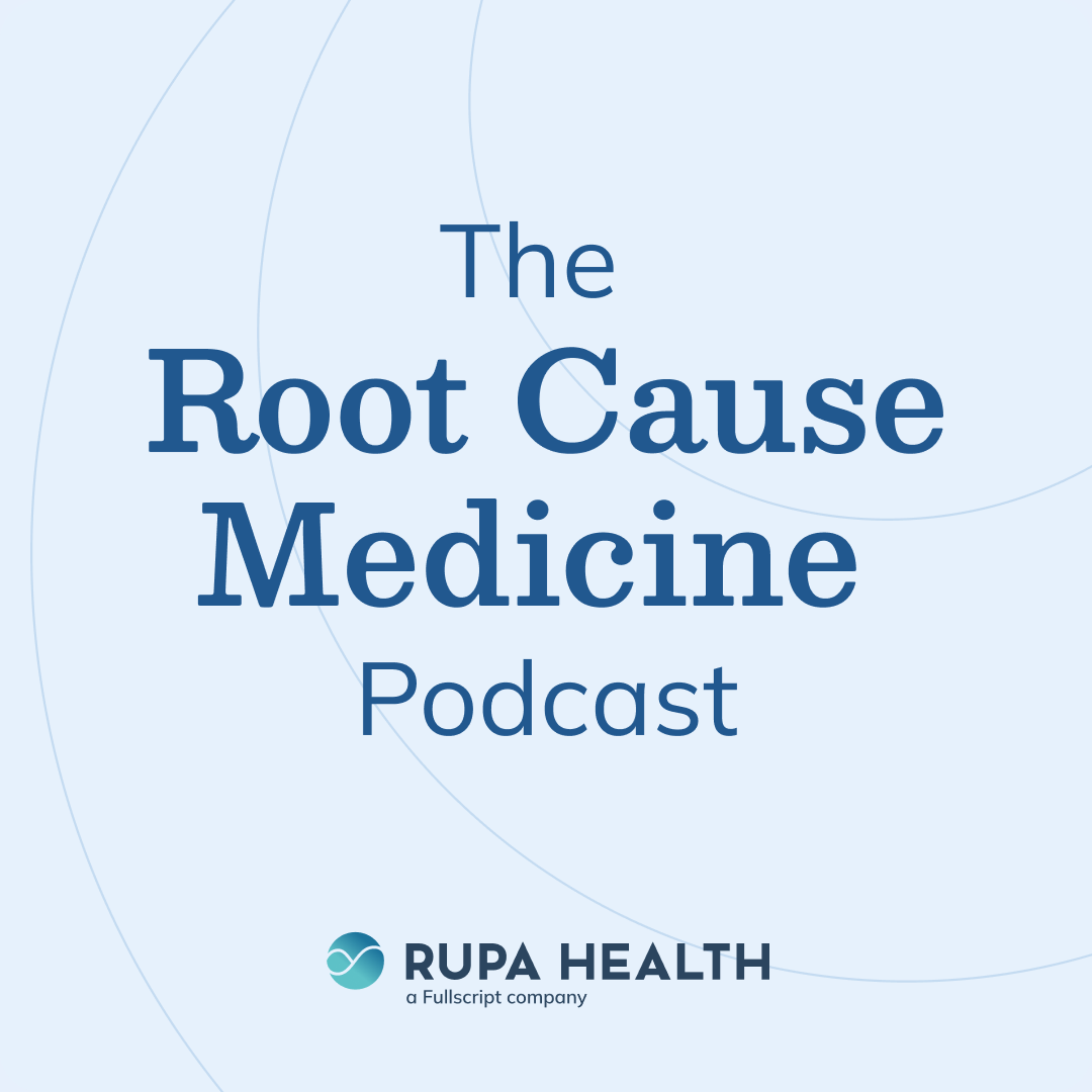Empowering Women with PCOS: A Functional Medicine Approach with Dr. Natalie Underberg
March 30, 2023

The Root Cause Medicine Podcast is created by Rupa Health, the best way to order, track & manage results from 30+ lab companies in one place for free.
The Root Cause Medicine Podcast is a weekly one-on-one conversation with renowned medical experts, specialists, and pioneers who are influencing the way we look at our health and wellbeing. This week we’re joined by Dr. Natalie Underberg, CEO of The PCOS Doc.
In this episode, Dr. Natalie Underberg shares the causes, strategies, and lifestyle changes necessary to effectively manage Polycystic Ovarian Syndrome (PCOS).
As a seasoned researcher with over a decade of experience studying PCOS, Dr. Natalie is a distinguished expert in her field. In addition to earning her doctoral degree, she has devoted countless hours to advanced functional medicine training through the Institute of Functional Medicine and Apex Energetics, as well as intensive coursework in internal disorders through the American Board of Chiropractic Internists.
Dr. Natalie was personally diagnosed with PCOS in 2010, and has since been dedicated to educating, empowering, and advocating for women who also grapple with this complex condition. Alongside her work helping women with PCOS, Dr. Natalie specializes in assisting women with infertility and other hormone-related issues from a holistic perspective.
Key Takeaways:
What is PCOS?
PCOS, which stands for Polycystic Ovary Syndrome, is a hormonal disorder that affects women of reproductive age. Women with PCOS have imbalanced levels of hormones, such as higher levels of androgens and insulin, which can cause a range of symptoms, including irregular menstrual cycles, fatigue, acne, excessive hair growth, weight gain, and even difficulty getting pregnant. Dr. Natalie states that one in seven women are now dealing with PCOS.
Challenges of PCOS diagnosis and management
When it comes to a PCOS diagnosis, thorough investigations are not being done. There's also a misconception that you need a cyst on your ovaries to qualify for a PCOS diagnosis, which is not true. Many women are being misdiagnosed or mislabeled due to either the presence or lack of polycystic ovarian morphology.
If a woman has two of the three Rotterdam criteria, she has PCOS. However, Dr. Natalie believes there is a need for more expansive criteria for diagnosing PCOS than the current Rotterdam criteria. She also mentions that PCOS is a lifelong condition that can be managed well with the proper practices and strategies.
Exploring the Rotterdam criteria
In order to qualify someone for a PCOS diagnosis, specialists look for two of the three Rotterdam criteria, which are the presence of polycystic ovarian morphology or a cyst, ovulatory dysfunction, and the presence of excess androgens based on labs. However, Dr. Natalie also looks for other signs like inflammation, insulin resistance, chronic stressors, chronic adrenal dysfunction, and more.
What causes PCOS?
The root causes or drivers of PCOS include inflammation, insulin resistance, environmental toxins, stressors, childhood trauma, sexual trauma, and toxic maternal relationships. Night shift workers, gymnasts, and high-level athletes often have adrenal stress patterns which can lead to hormone dysregulation and PCOS. Additionally, genetics can play a role in PCOS development as well as metabolic issues such as pancreatic beta cell dysfunction and insulin resistance.
Dr. Natalie's bits of advice
Adopt lifestyle strategies such as getting exposure to natural light within twenty minutes of waking, eating breakfast outside, taking a ten-minute walk after meals, establishing a consistent sleep pattern, eating an anti-inflammatory diet, managing stress through meditation and vagus nerve exercises, using essential oils for self-care, and re-evaluating close relationships. You can also use supplements, herbal therapies, bioidenticals, and natural antimicrobials.
Also, check out Dr. Underberg’s recommended lab testing: CBC CMP lipid panel, Iron and ferritin panel, DHEA and DHEAS tests, Progesterone test, Pituitary test, LH and FSH tests, Full thyroid panel, Insulin testing, LDH test, A1C test, DUTCH test, GI-MAP test, CDSA test
Order tests through Rupa Health - https://www.rupahealth.com/reference-guide
In this episode, Dr. Natalie Underberg shares the causes, strategies, and lifestyle changes necessary to effectively manage Polycystic Ovarian Syndrome (PCOS).
As a seasoned researcher with over a decade of experience studying PCOS, Dr. Natalie is a distinguished expert in her field. In addition to earning her doctoral degree, she has devoted countless hours to advanced functional medicine training through the Institute of Functional Medicine and Apex Energetics, as well as intensive coursework in internal disorders through the American Board of Chiropractic Internists.
Dr. Natalie was personally diagnosed with PCOS in 2010, and has since been dedicated to educating, empowering, and advocating for women who also grapple with this complex condition. Alongside her work helping women with PCOS, Dr. Natalie specializes in assisting women with infertility and other hormone-related issues from a holistic perspective.
Labs Mentioned:
Labs Mentioned:
- CBC CMP lipid panel
- Iron and ferritin panel
- DHEA and DHEAS tests
- Progesterone test
- Pituitary test
- LH and FSH tests
- Full thyroid panel
- Insulin testing
- LDH test
- A1C test
- DUTCH test
- GI-MAP test
- CDSA test
Learn more about Dr. Natalie Underberg:
- Dr. Natalie Underberg’s Website
- Dr. Natalie Underberg on LinkedIn
- Dr. Natalie Underberg on Instagram
- The PCOS Doc Shop
- Roland Functional Medicine Website
Rupa Health Details:
- Rupa Health's Website
- Rupa Health on LinkedIn
- Rupa Health on Facebook
- Rupa Health on Instagram
- Rupa Health on Tik Tok
- Rupa Health on YouTube
- Rupa Health Reference Guide
- Dr. Carrie Jones on LinkedIn
- Dr. Carrie Jones on Instagram
- Dr. Carrie Jones on TikTok
If you enjoyed this episode then please either:
- Follow, rate, and review on Apple Podcasts
- Follow on Spotify